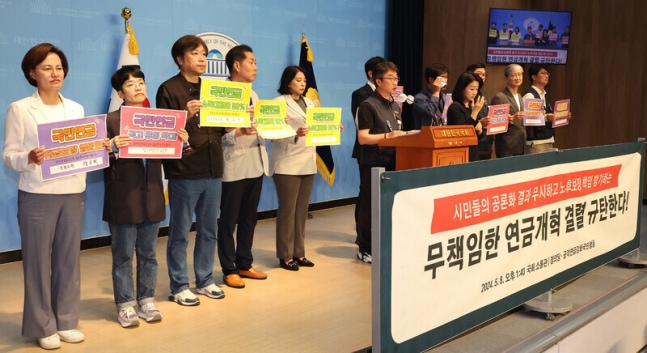Pension Special Committee, “Handing Over to the New National Assembly” with Deadline Approaching
Civil Society Organizations Criticize “Irresponsible Behavior” for Ending Activities
Even the Narrowed Disagreements on Basic Reform are Reversed,

Chairman of the Justice Party, Kim Jun-woo, and lawmakers Kang Eun-mi and members of the National Movement for Strengthening Public Pensions are holding a press conference condemning the failure of pension reform at the National Assembly’s Communication Hall in the afternoon of the 8th. Yonhap News,
, ‘With about three weeks remaining before the expiration of the deadline, there is increasing criticism that the 21st National Assembly’s Pension Special Committee, despite having time left, is handing over pension reform to the new assembly, which is seen as irresponsible. The ruling party has justified the need for “structural reform” that changes the pension system itself, but there are opinions that resetting even urgent basic reforms (changes in insurance premium rates and income replacement rates) is problematic.’,
,
, ‘The National Movement for Strengthening Public Pensions held a press conference at the National Assembly’s Communication Hall on the 8th, criticizing, “The ruling party and others ultimately failed to reach an agreement on pension reform by declaring the termination of activities when the 21st National Assembly still has more than 20 days left. Kim Eun-jeong, director of the Participatory Coalition Secretariat, stated, “Declaring the end of activities due to negotiation breakdown while the 21st National Assembly has around 20 days left is a very irresponsible act.”‘,
,
, ‘On the 7th, Yoo Kyung-jun, the ruling party’s representative on the Pension Special Committee, stated at a press conference, “If we look at the public consultation process of the Pension Special Committee, it has been mainly focused on basic reforms, and discussions on structural reforms have not been conducted properly. Without structural reform, it is difficult to accept pension reform.” It was revealed that the ruling party has been advocating for structural reforms through measures such as introducing the Notional Defined Contribution (NDC) system since the end of last month. This system adjusts the payment amount based on factors like economic growth rate and expected remaining lifespan starting from the age when pension benefits are received, while currently, the payment amount is fixed.’,
,
, ‘While the need for structural reform cannot be denied, reaching national consensus on the reduction of benefits requires more time than basic reform. Furthermore, there are counterarguments that such structural reforms, while potentially increasing the fiscal sustainability of the National Pension, may weaken its function of income security. In response, experts have suggested adjusting insurance premium rates instead of changing the structure of the National Pension to ensure fiscal soundness. The Private Advisory Committee of the Pension Special Committee, which ceased activities at the end of October last year, submitted a report to the National Assembly stating, “Basic reforms should be prioritized within the framework that does not obstruct structural reform, in order to secure sustained momentum for pension reform.”‘,
,
, ‘With the Pension Special Committee effectively announcing the breakdown of discussions, there is a growing possibility that even the relatively narrowed disagreements on basic reform will return to square one. The ruling party has proposed increasing insurance premium rates to 13% (currently at 9%) and income replacement rates to 43% (by 2028), while the Democratic Party has suggested 13% insurance premium rates and 45% income replacement rates. The Public Representatives’ Panel of the Public Consultation Body, which conducted deliberations earlier, favored the proposal of 13% insurance premium rates and 50% income replacement rates. Both ruling and opposition parties, as well as the public, have reached an agreement to raise the insurance premium rate to 13%.’,
,
, ‘Professor Seok Jae-eun from Hallym University (Social Welfare) commented to Hankyoreh, saying, “Deciding on the direction of basic reform creates room for structural reform,” and pointed out, “In this situation, delaying the entire pension reform by calling for structural reform that is achievable within the narrowed range of opinions is a dereliction of duty on the part of the National Assembly.”‘,
,
, ‘There are concerns that it will be even more difficult to advance pension reform in the next National Assembly. Kang Eun-mi, a Justice Party member and a member of the Pension Special Committee, stated to Hankyoreh, “Ending pension reform discussions with agreement solely between the ruling and opposition party representatives, after spending budget and citizens’ time for deliberation, is not a responsible attitude. By the end of May, within the term of the 21st National Assembly, the Pension Special Committee must reconvene and reach an agreement on pension reform.”‘,
,
,

